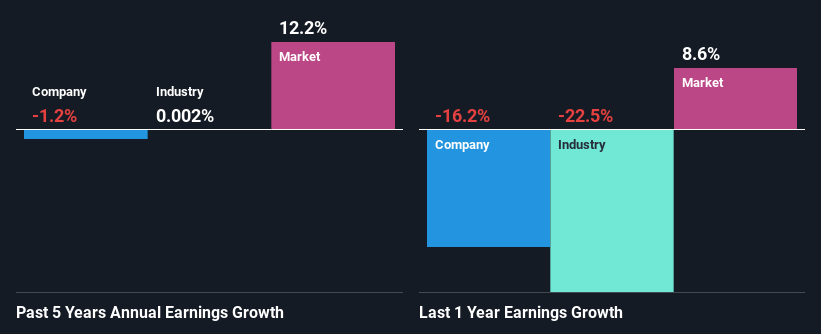- United Kingdom
- /
- Consumer Durables
- /
- LSE:BKG
The Berkeley Group Holdings plc (LON:BKG) Stock's Been Sliding But Fundamentals Look Decent: Will The Market Correct The Share Price In The Future?

Berkeley Group Holdings (LON:BKG) has had a rough three months with its share price down 10%. However, the company's fundamentals look pretty decent, and long-term financials are usually aligned with future market price movements. Specifically, we decided to study Berkeley Group Holdings' ROE in this article.
Return on equity or ROE is a key measure used to assess how efficiently a company's management is utilizing the company's capital. In other words, it is a profitability ratio which measures the rate of return on the capital provided by the company's shareholders.
Check out our latest analysis for Berkeley Group Holdings
How Do You Calculate Return On Equity?
The formula for return on equity is:
Return on Equity = Net Profit (from continuing operations) ÷ Shareholders' Equity
So, based on the above formula, the ROE for Berkeley Group Holdings is:
11% = UK£382m ÷ UK£3.5b (Based on the trailing twelve months to October 2024).
The 'return' is the profit over the last twelve months. Another way to think of that is that for every £1 worth of equity, the company was able to earn £0.11 in profit.
What Is The Relationship Between ROE And Earnings Growth?
So far, we've learned that ROE is a measure of a company's profitability. We now need to evaluate how much profit the company reinvests or "retains" for future growth which then gives us an idea about the growth potential of the company. Generally speaking, other things being equal, firms with a high return on equity and profit retention, have a higher growth rate than firms that don’t share these attributes.
Berkeley Group Holdings' Earnings Growth And 11% ROE
To begin with, Berkeley Group Holdings seems to have a respectable ROE. Further, the company's ROE compares quite favorably to the industry average of 5.6%. However, we are curious as to how the high returns still resulted in flat growth for Berkeley Group Holdings in the past five years. Therefore, there could be some other aspects that could potentially be preventing the company from growing. Such as, the company pays out a huge portion of its earnings as dividends, or is faced with competitive pressures.
As a next step, we compared Berkeley Group Holdings' net income growth with the industry and discovered that the company's growth is slightly less than the industry average growth of 0.002% in the same period.

Earnings growth is an important metric to consider when valuing a stock. It’s important for an investor to know whether the market has priced in the company's expected earnings growth (or decline). By doing so, they will have an idea if the stock is headed into clear blue waters or if swampy waters await. Has the market priced in the future outlook for BKG? You can find out in our latest intrinsic value infographic research report.
Is Berkeley Group Holdings Using Its Retained Earnings Effectively?
Berkeley Group Holdings' low three-year median payout ratio of 18% (implying that the company keeps82% of its income) should mean that the company is retaining most of its earnings to fuel its growth and this should be reflected in its growth number, but that's not the case.
In addition, Berkeley Group Holdings has been paying dividends over a period of at least ten years suggesting that keeping up dividend payments is way more important to the management even if it comes at the cost of business growth. Our latest analyst data shows that the future payout ratio of the company is expected to rise to 50% over the next three years. However, the company's ROE is not expected to change by much despite the higher expected payout ratio.
Conclusion
In total, it does look like Berkeley Group Holdings has some positive aspects to its business. Although, we are disappointed to see a lack of growth in earnings even in spite of a high ROE and and a high reinvestment rate. We believe that there might be some outside factors that could be having a negative impact on the business. Additionally, the latest industry analyst forecasts show that analysts expect the company's earnings to continue to shrink in the future. Are these analysts expectations based on the broad expectations for the industry, or on the company's fundamentals? Click here to be taken to our analyst's forecasts page for the company.
Valuation is complex, but we're here to simplify it.
Discover if Berkeley Group Holdings might be undervalued or overvalued with our detailed analysis, featuring fair value estimates, potential risks, dividends, insider trades, and its financial condition.
Access Free AnalysisHave feedback on this article? Concerned about the content? Get in touch with us directly. Alternatively, email editorial-team (at) simplywallst.com.
This article by Simply Wall St is general in nature. We provide commentary based on historical data and analyst forecasts only using an unbiased methodology and our articles are not intended to be financial advice. It does not constitute a recommendation to buy or sell any stock, and does not take account of your objectives, or your financial situation. We aim to bring you long-term focused analysis driven by fundamental data. Note that our analysis may not factor in the latest price-sensitive company announcements or qualitative material. Simply Wall St has no position in any stocks mentioned.
About LSE:BKG
Berkeley Group Holdings
Engages in the residential-led and mixed-use property development and ancillary activities in the United Kingdom.
Excellent balance sheet and good value.
Similar Companies
Market Insights
Community Narratives




